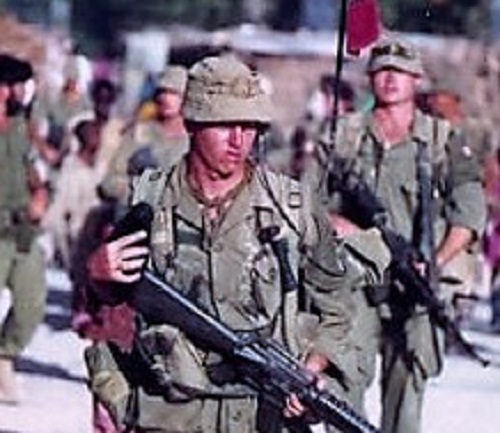Nightmares, delusional paranoia, aggression and thoughts of self-harm. These are some of the severe neurological symptoms experienced by a retired medical assistant in the Canadian Armed Forces after being “ordered” to take an anti-malaria drug while he was stationed in Somalia.
Hervey Blois told the House of Commons standing committee on veterans affairs on Thursday that he was part of a 900-strong Canadian Airborne regiment battle group in Somalia in 1993 when he first started taking the drug mefloquine under orders. The committee heard from other veterans how their lives were altered and in some cases destroyed by the drug which was administered to them as part of a clinical trial.
“This was months prior to the drug’s formal approval as a licensed medication by Health Canada,” he said in a statement. “…I was never told what these known adverse effects were, nor was I ever told to discontinue the drug if any of these adverse effects develop.”
Mefloquine was developed by the United States Army in the 1970s and saw use in the mid-1980s. It is manufactured and sold by Hoffman-La Roche under the name Lariam. A generic version of the drug is called Apo-Mefloquine which is produced by Apotex in Canada.
It’s known serious side effects included potentially long-term mental health problems such as depression, hallucinations, and anxiety and neurological side effects such as poor balance, seizures, and ringing in the ears. It is therefore not recommended in people with a history of mental health problems or epilepsy. Common side effects include vomiting, diarrhea, headaches, and a rash.
The drug’s association with psychiatric and physical side effects prompted the U.S. military to stop its general use. A United Kingdom parliamentary defence committee also recommended that the British military only use Mefloquine as a “drug of last resort.”
Back in 1993, Blois said, he and a number of his unit members were ordered to take the drug as part of an experimental study. Had he been informed of the symptom, Blois said, he would have stopped using the drug. Instead, Blois he continued using the mefloquine for several weeks.
“Since my return, I have developed a number of severe psychiatric symptoms, including profound anxiety, aggression, delusional paranoia, and frequent thoughts of self-harm,” Blois said in his statement. “In 1998, during a delusional episode, I entered into a period of mental breakdown, which caused my admission to the psychiatric ward of the Royal Alexandria Hospital in Edmonton, Alberta.”
Following his medical release from the armed forces in 2001, Blois was diagnosed with post-traumatic stress disorder (PTSD).
Treatments for PTSD, however, do not work in case of brain damage due to Mefloquine, according to a worker for the International Mefloquine Veterans’ Alliance.
Another soldier from Blois’ regiment, paratrooper Claude Lalancette, said he can trace his mental health issues to the drug.
“This is where I can retrace the route of my mental-health issues,” Lalancette was quoted as saying in a Globe and Mail report. “We were young and so well-trained for this mission. But the intensity of our aggression and psychoses led to the closure of Canada’s elite – the Canadian Airborne Regiment.”
The regiment was disbanded in 1995 due to what has been known as the Somalia Affair which revolved around members of the regiment Master Corporal Clayton Matchee and Private Kyle Brown being charged in the beating death of Shidane Arone, a 16-year-old Somali.
Lalancette blamed mefloquine for Matchee and Brown’s actions.
Blois said the onus falls on the federal government to acknowledge the harm done, investigate, and address the problems caused by the testing of the drugs on soldiers.


Comments are closed.